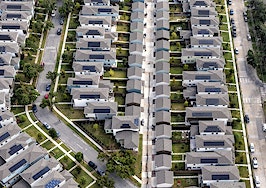African Americans are significantly more likely to be denied a mortgage due to low appraisals than white borrowers, even after controlling for individual and neighborhood characteristics and the state of the economy, according to a study commissioned by Illinois Realtors.
The trade group, which has more than 50,000 members, established a Discriminatory Appraisal Task Force earlier this year to conduct research, educate its members and policymakers and find solutions to an issue that has gained more and more media attention in the last couple of years: home appraisals that rise after Black homeowners remove any sign of their race from their home.
Illinois Realtors contracted with Dr. Marshall Jean, assistant instructional professor of sociology at the University of Chicago, to conduct the study, “Color and Collateral: Examining Individual and Neighborhood Effects of Race on Housing Valuation and Mortgage Lending,” along with Gideon Blustein, Illinois Realtors’ senior director of local government and external affairs.
The study looked at millions of mortgage applications from the federal Home Mortgage Disclosure Act (HMDA) database from 2007 to 2020 and focused on mortgage denials due to a “lack of collateral,” which Illinois Realtors said is “an indicator that the home appraisal value was substantially lower than the amount of the mortgage.”
The study found a “substantial disparity in the denial rates of African American and white applicants in every year of data” with an average disparity of between one and two percentage points. While that gap may sound small, it adds up to thousands of borrowers: For instance, a 1.05 percentage point difference in 2019 resulted in an estimated 8,150 additional mortgages being denied to Black borrowers.
The study also found that Black applicants in Illinois are twice as likely to have mortgages denied due to lack of collateral compared to white applicants: 8.7 percent versus 3.5 percent, based on more than 600,000 applications in the most recent three years of data.
“It is important that we identify any lingering systemic issues in housing equity and take steps to eliminate them as soon as possible,” said Jeff Baker, Illinois Realtors’ CEO, in a statement.
“We want to ensure fairness in the appraisal, selling and buying of homes. Everyone deserves the opportunity to achieve the dream of homeownership.”
One “surprise” finding was that appraisers appeared to reward neighborhood homogeneity, appraising homes more highly if a neighborhood was all-white or all-Black and the borrower matched that demographic, Blustein noted in a podcast about the study.
“For Black and Hispanic/Latino borrowers, living in a census tract with a greater proportion of minority residents decreased the odds of loan denial,” Illionis Realtors said. “But White borrowers living in a census tract with a greater proportion of Black or Hispanic residents were more likely to be denied a mortgage due to lack of collateral. These effects persist even after controlling for applicant and neighborhood socioeconomic factors.”
That finding is reminiscent of Newsday‘s 2019 investigation of racial discrimination among agents in Long Island, where agents steered buyers away from neighborhoods that didn’t match their race.
Jean, one of the report’s authors, said that further study is needed to explore the relationship between borrowers’ races and their homes’ appraised values and mortgage acceptance. He added that he would like to broaden the analysis to include more detailed information on home appraisals.
“Although the phenomenon of home appraisal discrimination has been known in the African-American community for decades, there has been very little formal research on it,” Jean said. “A key barrier is a lack of available data, which tends to be held by financial institutions and entities like Fannie Mae and Freddie Mac. There are privacy concerns, but those can be addressed with care. The first step to preventing discrimination in appraisals will be a better scientific understanding of it.”
In September, researchers at Freddie Mac released a landmark study that confirmed the existence of an “appraisal gap” for homeowners in predominantly Latino and Black neighborhoods, where appraisals are more likely to come in below the contract price than in majority white census tracts.
“It is very important that we get to the bottom line and eradicate these remaining vestiges of systemic injustices from the real estate appraisal and home loan process as soon as possible,” said Lutalo McGee, Illinois Realtors’ Discriminatory Appraisal Task Force Chair and owner of Ani Real Estate, in a statement.
“This affects everyone, and we all need to be concerned that it still exists. Think about this being your grandmother’s hard earned nest egg being stripped away. Or you and your spouse could struggle and sacrifice only to have your financial gains eroded for no factual reason.”
The task force will next get the study into the hands of policymakers and consumers to show there is a problem with bias in appraisals, according to Blustein.
“What that can help us do is really help consumers know what they can do about it,” he said. “So if they experience or they suspect that they experience bias, they can actually go and find out what to do by going to IllinoisRealtors.org/appraisals. Or the other aspect of it is sharing this with influencers and policymakers so that they recognize that this is a problem, and we need to look at potential solutions to this problem.’
Over the next month or two, the task force is working on a set of either legislative or regulatory proposals to tackle the issue, including how to diversify the appraisal industry, Blustein added.
“One of the problems that some researchers have focused on is the fact that there are very few Black residential real estate appraisers and so what can we do to make that more of an attractive career path or an attractive field to try to diversify the industry so it’s more reflective of the population of Illinois,” he said.












